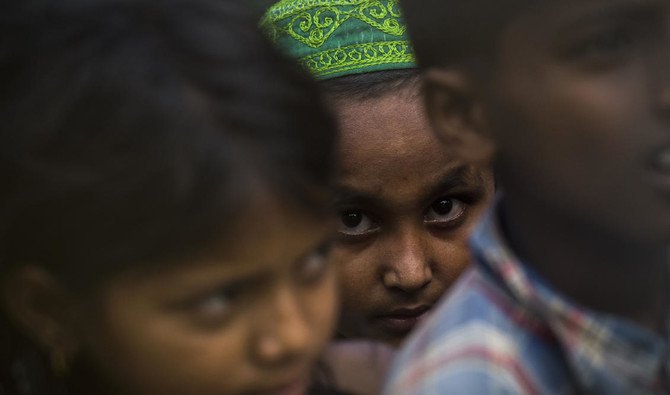Rohingya will be safe in areas ‘designated’ for them: Myanmar army chief
Arab News, May 05, 2018
700,000
Rohingya Muslims fled Buddhist-majority Myanmar to Bangladesh after the
military launched a brutal crackdown on insurgents in August that the US and
the UN have called ethnic cleansing. More than
120,000 Rohingya still reside in camps for internally displaced people in the
Rakhine state capital Sittwe
Rohingya Muslims fled Buddhist-majority Myanmar to Bangladesh after the
military launched a brutal crackdown on insurgents in August that the US and
the UN have called ethnic cleansing. More than
120,000 Rohingya still reside in camps for internally displaced people in the
Rakhine state capital Sittwe
 |
| Rohingya refugee children gather in the “no man’s land” behind Myanmar’s boder lined with barb wire fences in Maungdaw district, Rakhine state bounded by Bangladesh on April 25, 2018. (Ye Aung Thu/AFP) |
YANGON:
Rohingya refugees who return to Myanmar will be safe as long as they stay in
the model villages built for them, the country’s army chief has said, renewing
fears they will be kept in settlements indefinitely.
Some
700,000 Rohingya Muslims fled Buddhist-majority Myanmar to Bangladesh after the
military launched a brutal crackdown on insurgents in August that the US and
the UN have called ethnic cleansing.
700,000 Rohingya Muslims fled Buddhist-majority Myanmar to Bangladesh after the
military launched a brutal crackdown on insurgents in August that the US and
the UN have called ethnic cleansing.
Myanmar
and Bangladesh agreed to repatriate refugees to conflict-hit Rakhine state last
year but Rohingya are loathe to come back to a country without guarantees of
safety and basic rights such as freedom of movement.
and Bangladesh agreed to repatriate refugees to conflict-hit Rakhine state last
year but Rohingya are loathe to come back to a country without guarantees of
safety and basic rights such as freedom of movement.
The
country’s powerful army chief Min Aung Hlaing compounded those fears when
speaking to a visiting delegation from the UN Security Council in the capital
Naypyidaw on April 30.
country’s powerful army chief Min Aung Hlaing compounded those fears when
speaking to a visiting delegation from the UN Security Council in the capital
Naypyidaw on April 30.
“There is
no need to be worried about their security if they stay in the areas designated
for them,” he told the delegation, according to a readout of the meeting posted
on Min Aung Hlaing’s official Facebook page on Saturday.
no need to be worried about their security if they stay in the areas designated
for them,” he told the delegation, according to a readout of the meeting posted
on Min Aung Hlaing’s official Facebook page on Saturday.
He
referred to members of the stateless minority as “Bengalis,” reflecting a
widespread belief in Myanmar that the Rohingya are immigrants from Bangladesh
despite a longstanding presence in Rakhine.
referred to members of the stateless minority as “Bengalis,” reflecting a
widespread belief in Myanmar that the Rohingya are immigrants from Bangladesh
despite a longstanding presence in Rakhine.
The army
chief also cast doubt on the allegations raised by refugees in Bangladesh, many
of whom shared stories of extrajudicial killings, arson and rape.
chief also cast doubt on the allegations raised by refugees in Bangladesh, many
of whom shared stories of extrajudicial killings, arson and rape.
“Bengalis
will never say that they arrive there happily. They will get sympathy and
rights only if they say that they face a lot of hardships and persecution,” he
reportedly said, adding that the issue was “exaggerated.”
will never say that they arrive there happily. They will get sympathy and
rights only if they say that they face a lot of hardships and persecution,” he
reportedly said, adding that the issue was “exaggerated.”
The UN has said conditions on the ground are not ripe for the refugees to
return, despite Myanmar’s insistence that it is ready even as no large-scale
repatriation has occurred.
The
government has built transit camps that can accommodate tens of thousands of
people and a much smaller number of new houses to replace fire-blackened
villages where Rohingya used to live.
government has built transit camps that can accommodate tens of thousands of
people and a much smaller number of new houses to replace fire-blackened
villages where Rohingya used to live.
The
minority community has been persecuted in Myanmar for decades and Rohingya have
lived in what rights groups have called apartheid-like conditions, with severe
restrictions on movement and access to health services.
More than 120,000 Rohingya still reside in camps for internally displaced
people in the Rakhine state capital Sittwe as a result of intercommunal
violence in 2012 that killed hundreds.
minority community has been persecuted in Myanmar for decades and Rohingya have
lived in what rights groups have called apartheid-like conditions, with severe
restrictions on movement and access to health services.
More than 120,000 Rohingya still reside in camps for internally displaced
people in the Rakhine state capital Sittwe as a result of intercommunal
violence in 2012 that killed hundreds.
Dil Mohamed, a Rohingya leader sheltering on the border, told reporters late
last month that refugees do not want to stay in any transit camps due to
similar concerns that they will be more than temporary.
“We are waiting here only until we are allowed to go back to our home,” he
said.


